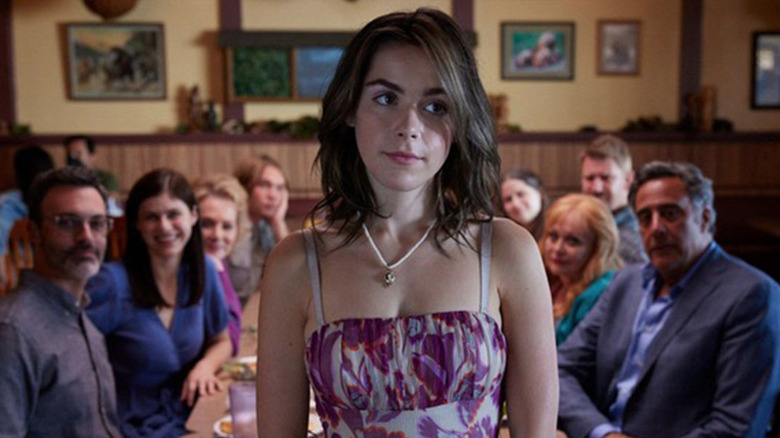Wildflower Review: When Disability Representation Goes Wrong [TIFF]
"Wildflower," Matt Smukler's debut feature film, is a "personal" project — at least that's what we were told before the film screened at the Toronto International Film Festival. But unless Smukler lived a former life as a teenage girl, or he himself is intellectually delayed and/or was raised by disabled parents, this isn't really personal in the sense that this isn't his story. If it was his story, I'm sure it would have been handled with much more care.
Note: The "Wildflower" filmmakers did consult RespectAbility and Miracle Project founder Elaine Hall.
The truth is, Smukler does have a familial connection here (so it is, technically, "personal"): According to Deadline, his documentary of the same name is based on the "inspiring story of his niece ... [who] cares for both of her parents." The tag line for that film reads "resilience was the one thing no one could take away" (cue eye rolls).
"Wildflower" is a film that fumbles, struggling to handle complicated issues like disability and parental rights. The movie follows teenage wunderkind Bea (Kiernan Shipka), who has been hospitalized after a mysterious accident. The movie builds up to the big reveal of what happened (it's not satisfying), and relies on voice-over narration from comatose Bea to tell her story of how she got there. It's all very kitsch. Her parents, Sharon (Samantha Hyde — a neurodivergent actress in her first feature film) and Derek (Dash Mihok), are both intellectually delayed; Sharon was born with a disability impairing her brain's development while Derek lost some of his cognitive function as a result of a traumatic brain injury. Rather than use these terms, however, the film prefers to use the infantilizing term "special" or — more than once — "retarded."
Already, "Wildflower" is drawing comparisons to Apple TV+'s "CODA," the Oscar-winning feature film about a child raised by deaf parents. Smukler's film, however, is much more problematic. It's "inspiration porn," as one of my disability rights activist friends would say — a movie in which disability is simply a backdrop for an able-bodied protagonist's personal journey.
Mixed performances in a mediocre movie
Kiernan Shipka does an adequate job in "Wildflower" as the mature-beyond-her-years Bambi "Bea" Johnson. The message — driven home with the force and ferocity of a jackhammer — is that poor, sweet, amazing Bea was forced to grow up because her parents needed to be taken care of. (I think that's what the title is hinting at: a flower that just grows in the wild without needing to be tended.) Bea practically raised herself from infancy, and then turned around and took over care-giving duties for her parents.
The vibe "Wildflower" is going for with Bea doesn't quite work, however, because of the actor's age. Instead of seeming unusually mature, she just comes across as a woman, not a teenager. In the sea of problems this movie has, Bea and her love interest Ethan's (Charlie Plummer) casting is a relatively minor one, but still of note. Both Shipka and Plummer are in their 20s and they look like it. Acting can only do so much — and the dialogue and direction in their scenes certainly doesn't help.
The clear standouts in "Wildflower" are, predictably, reliable character actors Jean Smart, Jacki Weaver, and Brad Garrett. Smart and Weaver play the clashing matriarchs, Peg and Loretta, while Garrett plays Peg's ex-husband Earl. The scenes of Peg and Loretta squabbling are some of the only genuinely funny moments in the film, while Earl gets what feels like the only authentic emotional blow up. All three actors are criminally underused — Garrett in particular.
Finally, the parents, Hyde and Mihok, are ... fine. I don't know if it's even fair to judge the acting, however, because what they're trying to accomplish is very difficult to pull off, and they certainly didn't have the benefit of good direction. Hyde has many scenes in which she stares blankly into space, while Mihok seems to be doing some sort of "dumb redneck" routine. Little screen time was spent developing the parents' characters, or giving the audience a reason to like them — Hyde's Sharon in particular needed scenes showing her being a loving, caring mother.
The difference between empowering and exploitative
The main issue I have with "Wildflower" is that it's exploiting the disability of its characters rather than telling a genuinely empowering story. The movie fails to give the parents redeeming qualities or inner lives. They are paper-thin punchlines; Sharon and Derek often play fools, and we, the audience, are encouraged to laugh at them. We are similarly encouraged to find humor in Loretta's lack of class, and even Aunt Joy (Alexandra Daddario) being such an over-the-top helicopter parent. These characters are all two-dimensional, and the implied "jokes" are mean spirited. This is bad enough for Joy, but in the case of Loretta, and especially for Sharon and Derek, it too often feels like we're expected to laugh at how stupid poor people are.
Here's the thing: I actually do think a story like this could work. Twenty years ago, Sean Penn got an Academy Award nomination for his role as an intellectually delayed father in the film "I am Sam." That movie is far from perfect, but it at least made the story about the character with the disability, and great care was made to establish that he was a caring father. "Wildflower" doesn't even do this, instead presenting Derek as a somewhat lovable idiot and Sharon as a liability and a potentially dangerous burden on her family. We don't get meaningful interactions between the mother and daughter, and while it's clear that there is love there, we don't get to see how that love is beneficial for Bea — only how it's harmful.
I have disability in my life. I grew up with an autistic sibling, and I grew up too fast. I often worried about him, or felt like I had to help take care of him. At the very least, I know I tried to be as little trouble as possible for my parents' sake (at least until my rebellious years). I should be able to relate to Bea, but I don't — because while disability is a major part of who my brother is, it doesn't define him. He's a person with unique likes and dislikes. His life has inherent value. I wouldn't change him if I could. That's the message that "Wildflower" should be telling; instead, we got a story about a teenage girl who blossomed in spite of her upbringing, not because of it.
/Film Rating: 4 out of 10


